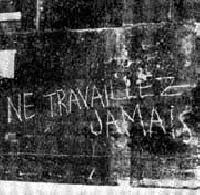On the Chilean "transition" part 3 1/2
Nelly Richard, one of the most prominent and influential critics of the transition in Latin America, suggests too that we cannot identify a clear-cut division between the dictatorship and the transition. In consonance with Moulian, Richard sees the democratic governments as merely the new managers of the inherited political and socioeconomic order, rather than having re-found it. Moulian and Richard agree with Willy Thayer about the true "transition" that operated in the transformation from a state-centered society to a post-state economy, where the state is not the subject but the object of the economy. More broadly, Richard is embarked in the project of criticizing the pretended "transparency" and neutrality of disciplinary language because these have been the tools that have made power, bureaucracy, and technocracy converge. Her work aims then to denounce the theatrical and staged artifices that construct meaning by presenting social reality as mono-referential.
